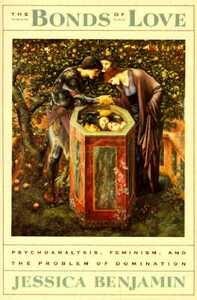Take a photo of a barcode or cover
9 reviews for:
The Bonds of Love: Psychoanalysis, Feminism, and the Problem of Domination
Jessica Benjamin
9 reviews for:
The Bonds of Love: Psychoanalysis, Feminism, and the Problem of Domination
Jessica Benjamin
Reading this book felt like both being on a really fun rollercoaster— things whizzing by (aka, large academic fields I have no big background in haha), the wind in my hair, the thrill and excitement!— AND this sense crouching on the ground, looking at very small rocks and examining them slowly in the palm of my hand...
What an extremely strange way to feel while reading a book. Not sure I've ever felt that way before, that sense of thrill, excitement, and extreme rigor. The fact that reading this took about 30-40 hours was also a part of this experience.
Though I'm sure a lot of it went over my head, and structurally, I'm going to miss things explaining this to others, this is a book I never... thought I would have been able to read, and I am surprised how enjoyable that was. It was also really satisfying to see that a lot of the "random" undirected reading of papers I've been doing over the past 10~ months was useful! And Benjamin helped give me context for all of those readings in her book, too, since it was mercifully written for someone without any psychoanalytic background.
I feel somehow internally changed, and yet I cannot say exactly how yet.
I will say that it was extremely gratifying to see my intense and healing experiences with my psychoanalytically-leaning therapist mirrored in this book.
I am also just so happy someone out there decided to sit down and think about how to rigorously integrate psychoanalysis and feminism, as I've come to really love what I've discovered in psychoanalysis thus far. I partially read this because I was concerned about some of the... misogynistic whiffs I was getting from some of the classical Freudian work I'd been reading about, and wondered if psychoanalysis could be "saved" theoretically for me... and I'm really glad to say that yes, this book has certainly made me feel that, even if not everybody agrees about it (even within the feminist and psychoanalytic umbrellas), there are at least a group of people that have found a way through this theoretical framework that is redemptive and with plenty of room for truthful paradox.
I have no idea if this is a book that others would enjoy, but I feel compelled to say: thank you Jessica Benjamin, for writing this book that has been so helpful to me at this very strange and particular phase of my life.
What an extremely strange way to feel while reading a book. Not sure I've ever felt that way before, that sense of thrill, excitement, and extreme rigor. The fact that reading this took about 30-40 hours was also a part of this experience.
Though I'm sure a lot of it went over my head, and structurally, I'm going to miss things explaining this to others, this is a book I never... thought I would have been able to read, and I am surprised how enjoyable that was. It was also really satisfying to see that a lot of the "random" undirected reading of papers I've been doing over the past 10~ months was useful! And Benjamin helped give me context for all of those readings in her book, too, since it was mercifully written for someone without any psychoanalytic background.
I feel somehow internally changed, and yet I cannot say exactly how yet.
I will say that it was extremely gratifying to see my intense and healing experiences with my psychoanalytically-leaning therapist mirrored in this book.
I am also just so happy someone out there decided to sit down and think about how to rigorously integrate psychoanalysis and feminism, as I've come to really love what I've discovered in psychoanalysis thus far. I partially read this because I was concerned about some of the... misogynistic whiffs I was getting from some of the classical Freudian work I'd been reading about, and wondered if psychoanalysis could be "saved" theoretically for me... and I'm really glad to say that yes, this book has certainly made me feel that, even if not everybody agrees about it (even within the feminist and psychoanalytic umbrellas), there are at least a group of people that have found a way through this theoretical framework that is redemptive and with plenty of room for truthful paradox.
I have no idea if this is a book that others would enjoy, but I feel compelled to say: thank you Jessica Benjamin, for writing this book that has been so helpful to me at this very strange and particular phase of my life.
informative
reflective
"Masochism can be seen, therefore, not only as a strategy for escaping aloneness, but also as a search for aloneness with the other: by letting the other remain in control, the masochist hopes to find a 'safe' open space in which to abandon the protective false self and allow the nascent, hidden self to emerge... The masochist’s wish to be reached, penetrated, found, released—a wish that can be expressed in the metaphor of violence as well as in metaphors of redemption—is the other side of the sadist’s wish to discover the other. The masochist’s wish to experience his authentic, inner reality in the company of an other parallels the sadist’s wish to get outside the self into a shared reality."
Overall it was a decent historical/psychoanalysis history of the psychology behind gender social norms; it is too wordy. Each chapter can be cut in half and still say the same thing. Yes, the way we were brought up is affected by the societal norms from generation from generation. Yes, all the males in psychology focused on men in their study and assumed that duality in things makes women the opposite. We know now that is not the case. But the book was interesting in regards that I read the 1988 edition and see how far we have come in a short matter in time in understanding but not in reality.
challenging
informative
reflective
slow-paced
Benjamin sees no need to distinguish erotic domination fantasy—where total psychic murder collapses the tension and provokes abandonment or actual murder—and lived experience of domination, where the extent of self effacement is the strength of the bind, and murder is the response to self assertion. This focus on a singular and inadequate model of domination severely limits the applicability of many of her arguments. While "personal power relationships" are acknowledged, they are of little interest. the universe depicted is contained to domestic dyads and occasionally triads whose dramas are little disturbed by outside forces, despite the objection made to public/private dualism and isolated conceptions of the self.
I felt like i was sifting through symbolic archetypes and Robert Stoller citations for the real meat, most of which had to do with intersubjectivity. The identification of rationality with domination is convincing, but the identification with inherent masculinism slides into the overdetermination of dichotomous gender that is evident throughout. For example:
I felt like i was sifting through symbolic archetypes and Robert Stoller citations for the real meat, most of which had to do with intersubjectivity. The identification of rationality with domination is convincing, but the identification with inherent masculinism slides into the overdetermination of dichotomous gender that is evident throughout. For example:
The ideal of the autonomous individual could only be created by abstracting from the relationship of dependency between men and women. The relationships which people require to nurture them are considered private, and not truly relationships with outside others. Thus the other is reduced to an appendage of the subject—the mere condition of his being—not a being in her own right.
This is a relationship of servitude, and presenting the autonomous ideal as one women are nar categorically excluded from erases the same capability of women to invisibilize labor they are dependent on.
A reorganization of key insights is in order.
emotional
informative
reflective
slow-paced
Delves into the oedipal complex in a manner that addresses the position of the woman as an active figure, instead of the passive and docile creature. The concept of sexuality is engaged with more rigorously and effectively than many other psychoanalysis works (including that of Freud and other male writers such as Marcuse, and Reich).
Ultimately discusses domination and why we are psychically orientated towards domination. What then is the solution to the problem of domination? How can domination be countered? Frustratingly, that is left open - as it should be.
Ultimately discusses domination and why we are psychically orientated towards domination. What then is the solution to the problem of domination? How can domination be countered? Frustratingly, that is left open - as it should be.
Remind me never to read a book with the word "psychoanalysis" in the title or subtitle. Feminist mumbo jumbo is still mumbo jumbo. And I didn't even agree with her principle arguments, especially in chapter 5. Grrr...waste of time.
No, psychoanalysis is still primarily useless aside from literary analysis... but hey, sometimes it produces really stunning works of contemplative feminism. Her discussion of the Story of O is obnoxious; instead of seizing the opportunity to interview an individual involved in the BDSM community, she just interrogates a piece of erotica. Other than that, stellar book.





